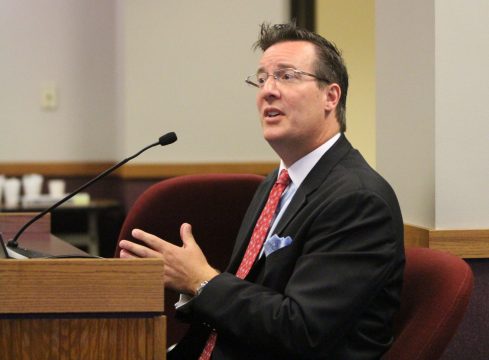The Joint Interim Committee on State Employee Wages convened Wednesday to hear from a consulting firm charged with evaluating Missouri’s compensation for state employees.
CBIZ Human Capital Services displayed their methodology and compared Missouri to the rest of the market in terms of pay, benefits and base salary within the executive branch with the primary purpose to enhance the state’s ability to attract and retain qualified workers.
Ed Rataj, the managing director of compensation consulting for CBIZ, stressed that the most important numbers showed Missouri falling below the market.
“When we look employee by employee, pay is 89.6 percent of the 50th percentile,” Rataj said. “Basically that means pay is 10.4 percent below market comparative on average.”

Part of CBIZ’s methodology finds that different grades of jobs usually have a smaller range of minimum and maximum salaries. Rataj added that that 5,050 employees are paid below the salary range minimum. Comparatively, 32,595 are within the range, and only 261 sit above the maximum. However, Rataj also added that the discrepancy did not impact every state worker.
“For lower paid positions in the state of Missouri, pay is pretty competitive,” he said. “For higher paying jobs, the state of Missouri starts to lose traction with the market.”
Rataj recommended that a collective sum of just under $13.7 million, one percent of payroll, paid to employees below that minimum could rectify the problem. Commissioner of the Office of Administration Doug Nelson said that was doable.
Rataj added that the state should also do a better job of informing its workers of their guaranteed benefits to get more value out of them and recommended a pay freeze for workers above the salary range maximum.
Nelson and Rep. Jay Barnes briefly discussed possible budgetary solutions for when the legislature reconvenes in January. Nelson said that he was “confident” his office and the General Assembly could write legislation that would specifically bring employees who fall under the minimum salary within that range.
CBIZ also found that Missouri ranked 50th of the 50 states when it came to average annual pay for employees as well as adjusted average annual pay which accounts for geographical differences. Missouri has earned that particular designation for the third year running, despite two percent pay raises passed by the General Assembly the last two years.
Sen. Kiki Curls, who joined by telephone, said that figure could give potential workers the impression that Missouri does not pay its employees well.
“The fact that Missouri ranks 50th is not something I’m very proud of,” she said.
Rep. Mike Bernskoetter, the chair of the committee, echoed similar frustrations.
“It’s discouraging we can’t get out of the basement,” he said. “We have a lot of things in the budget that are mandatory, so we keep working on the mandatory things, and we can’t get out of the basement,
“Even with this one percent increase, it wouldn’t get us out of the basement.”
Nelson and Rataj stated the focus, however, should be on how Missouri performs more related to its market and maybe the markets in bordering states, not the entire nation.
“The market definition for us to look at is the state of Missouri,” Nelson said. “It’s more relevant to look state to state. We’re really competing with the market within the state.
“I don’t see a receptionist moving from Jeff City to Colorado for the job.”
CBIZ will meet with more legislators in January to get their recommendations to a broader audience.









